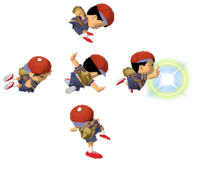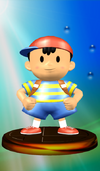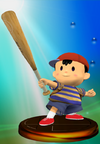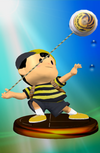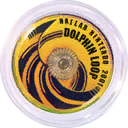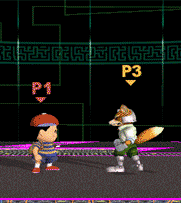Ness (SSBM)
| Ness in Super Smash Bros. Melee | |
|---|---|
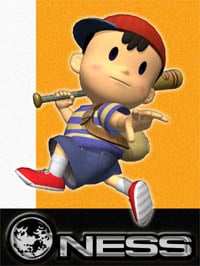 
| |
| Universe | EarthBound |
| Other playable appearances | in SSB in Brawl in SSB4 in Ultimate |
| Availability | Starter |
| Tier | D (23) (North America) H (23) (Europe) |
Ness (ネス, Ness) is a veteran starter character in Super Smash Bros. Melee, switching his availability status as an unlockable character from the original Super Smash Bros. to being available at the beginning of the game in Melee. He was one of the fourteen characters to be officially announced at E3 2001.
Makiko Ōmoto reprises her role as Ness' voice actor, providing a series of new voice-clips.
Ness is ranked 23rd out of 26 on Melee's current tier list, ranking within the lower half of D tier. This is a slight decline from his previously low ranking in Smash 64, where he was ranked 10th out of 12 characters in NTSC, and his technically dated as his worst ranking in the series to date. Ness still retains his excellent aerial and combo games thanks to his double jump canceling technique (a unique trait shared with Peach, Mewtwo and Yoshi), with all of his aerials being strong, quick, and useful for both comboing and KOing. His grab game is among the best across the cast, as each of his throws have practical and respective usage: his down throw is a viable combo starter, his up throw is a great chain grab against fast-fallers, and his back throw is the most versatile KO throw in the game. However, Ness is strongly held back by his almost non-existent approaching options on the ground (because of his poor grounded mobility, lackluster range, and his slow and short-ranged projectiles), as most characters can either easily predict/read him or punish his options, as well as his disproportionately weak KO power, as most of his finishers suffer from poor range, his smash attacks are extremely weak (up/down smashes) or are slow, have large and unreliable sourspots (forward smash). Finally, he also has one of the worst recoveries in the game due to the combination of angling issues within PK Thunder, and severe handicaps within PK Thunder 2. As a result of these significant weaknesses, Ness has terrible matchups, with six nearly unwinnable, and his favorable matchups being either too slow or having even worse range to combat his tools. As such, he is considered non-viable in competitive play, with matchups remaining overall very poor and having almost non-existent representation in the modern metagame.
Attributes
Ness is a unique, yet versatile blend of characteristic archetypes; several of his attributes are unique in comparison to other characters, such as his projectiles, his recovery and his midair jump. His movement is overall polarizing: while his walking and dashing speeds are below-average, he has an above-average air speed and high air acceleration. Ness also has above-average traction and a below-average falling speed, giving him an above-average wavedash that is relatively quick. Ness is a projectile-heavy character, as he possessing 3 projectiles: PK Flash, PK Fire and PK Thunder, while also featuring a healing move in his PSI Magnet.
Arguably Ness' greatest strength is his excellent combo game. Despite a poor SHFFL due to his high short hop and low falling speed, Ness has several ways to pressure and combo in the air thanks to his double jump cancel (often abbreviated DJC). By cancelling out of his midair jump with an aerial, Ness can quickly and efficiently perform his multiple aerial attacks to rack up damage and lead to KOs. This is especially important considering the utility of his aerial attacks, as his combo game is supported by Ness' great aerial game. His neutral aerial and forward aerial attacks function as potential combo starters (especially the latter) and the remainder of his aerials serve as good KO options. For their individual traits, neutral air serves as a viable get-off-me and gimping tool against recoveries, and forward air can chain into itself for walls of pain and is useful for edgeguarding as well. Meanwhile, his back aerial, while limited by lackluster range, is a useful wall-of-pain or KOing option when clean. His up aerial has high juggling capability while serving as a viable KOing option at higher precents, while down aerial is among the strongest meteor smashes in Melee, leading to easy gimps and early KOs even if stale. Due to this, his air-based approach is considered to be much better than his grounded approach.
Although Ness has a poor grounded approach, he still boasts a pair of effective options: his grab game and the yo-yo glitch. Ness' throws all have excellent utility; his forward throw has extremely high base knockback, making it ideal for starting edgeguards. His down throw is a decent combo starter, having potential to lead into his DJC'd aerials. His up throw is a decent chain grab and can be used in conjunction with PK Thunder to rack up damage or play mindgames, while it shares similar combo potential like his down throw. Finally, his back throw is the strongest throw in the entire game, making it a deadly KOing option. As for the yo-yo glitch, Ness is the only character to have access to this technique. It is initiated through his up smash, and can be used to attack or grab with near limitless range or attach certain single-hitbox attacks to Ness' body. This can significantly increase Ness' range and options when performed properly.
While he fares considerably worse on the ground, Ness' grounded game is not fundamentally useless, as it has some notable utility; his forward tilt is a solid poking/spacing tool that can be angled, and can KO at high precents while edgeguarding. His up tilt can easily set up into his combos, especially with DJC'd aerials. The move itself can juggle and KO at higher precents, especially on platforms. His down tilt is extremely spammable, making it useful for racking up immediate damage, jab locking, two-framing, confirming into a grab and inflicting high shield pressure. His dash attack is considered Ness' best grounded approaching option because of its considerable disjoint and quick speed. Its final hit can KO at higher precents, while it can lead into guaranteed aerial follow-ups. His smash attacks are a mixed bag overall: his forward smash is among the strongest in the game when the bat is tipped. It also has incredible range for Ness' size, and can reflect projectiles with correct timing, although it lasts for only 2 frames. However, it has slow startup and high ending lag, and has unimpressive power when untippered. His up and down smashes can 2-frame and edgeguard, while the former is a viable out of shield option and the contributor for the yo-yo glitch, and the latter can punish rolls, both KO considerably later than his other KO options in a neutral situation as the two are by far the weakest smash attacks of all kinds in the game.
Even though his special moves are widely situational, there are some notable exceptions: PK Flash boasts extreme power at full charge and is great for punishing poorly positioned opponents or predictable recoveries offstage, such as the space animals, or vulnerable recoveries, such as Mr. Game & Watch. It can also punish ledge-based options, such as ledge jumping, ledge attacking and/or rolling, making it formidable at edgeguarding. However, its usage is otherwise limited to that because of its considerable sluggishness. PK Fire is a projectile which creates a pillar of fire if it hits an opponent. It can trap opponents and leave them open for follow-ups, and can even gimp fast-fallers. While this can lead into followups, PK Fire is a slow and laggy projectile, which does not cover a lot of distance for a similar projectile. It is easily avoidable and punishable and even if it hits the opponent, they can very easily SDI out of the pillar and even potentially punish Ness. PK Thunder is a projectile which can be controlled and if it connects with Ness, he will shoot forwards, travelling a long distance with a powerful hitbox (known as PK Thunder 2). PK Thunder is Ness' most useful special move; it is unique for controlling a electrical ball which can be moved in any direction, allowing for mindgames, offstage gimps, and even a powerful KOing option in PK Thunder 2. However it has one critical flaw: the player loses control of Ness during the move, leaving him open to extremely powerful attacks if he cannot hit the opponent quick enough. While PK Thunder lasts for a long time and it can be controlled, it is rather laggy and the opponent can hit the PK Thunder to beat it out. If Ness is in the air after PK Thunder is destroyed, he will be sent into immediate helplessness, which can lead to him falling to the end of his stock offstage. PK Thunder 2 is Ness' primary means of recovery: while it does travel a long distance and can be angled in any direction, it takes a long time to set up, it can be interrupted during the second half of the dash and if Ness lands after entering helplessnesss, he will suffer from considerable amounts of of landing lag, all of which make PK Thunder and PK Thunder 2 an incredibly exploitable recovery. Finally, PSI Magnet can heal Ness and put him in a better position defensively. This also allows Ness to outmatch characters with projectile-heavy playstyles, such as Samus, but it is rather slow and completely dependent on the opposing character, as it only absorbs energy-based projectiles. Additionally, it takes a long time to start absorbing projectiles and if Ness does absorb a projectile, he will suffer from considerable amount of lag, which can potentially be punished.
Ness' greatest flaw, however, is his lack of range. All of his attacks (especially his tilts) have little range and/or small hitboxes, making his ability to hit an opponent very difficult. Although wavedashing can somewhat assist this problem, Ness' ground-based options have too little utility overall to benefit from it noticeably. When combined with his somewhat slow mobility, Ness has significant trouble approaching opponents. Thus, his dash attack is considered to be his only reliable grounded approach option, due to its decent range unlike most of his other attacks. In addition, Ness' grab has the second-shortest range in all of the game (only to Pikachu), thus making it difficult for him to take advantage of his versatile throws, while his dash grab is extremely laggy and barely improves its range. In turn, his dash grab has the shortest range in the game. Finally, against opponents with particularly good spacing games, most notoriously Marth, Ness can be easily overwhelmed in his attempts to approach opponents in the air despite the power of his DJC.
Assuming he can approach his opponents, Ness finds noticeable trouble KOing consistently, largely due to his poor power and range. He possesses by far the worst set of smash attacks in the game: his up and down smashes are by far the weakest of their kind, and his forward smash needs to be sweetspotted at the tip of the bat to KO effectively. Outside of his smash attacks, most of his strongest finishers suffer from poor range (his back, up and down aerials), long start-up and ending lag (his down aerial), low base knockback (up aerial and back throw), having small, unreliable sweetspots (his aforementioned forward smash), or simply being unsafe and situational (PK Flash and PK Thunder 2). While his back throw is a pratically safe and powerful KOing option, it requires grabbing the opponent first, which is an extremely high hassle considering the awful range of Ness' grabs.
Ness' special moveset also features some problems, being rather situational overall: PK Flash boasts extreme power when fully charged and is great for punishing poorly positioned opponents offstage, but it is limited to edgeguarding due to its sluggishness and being difficult to land. In addition, PK Flash's hitbox doesn't completely cover the visual radius of the explosion, making PK Flash overall surprisingly misleading. PK Fire can trap opponents and leave them open for follow-ups, and can even gimp fast-fallers. However, it has short reach for a projectile and is very easy to SDI out of, making it easy to punish. PK Thunder is Ness' most useful special move; it is unique for controlling a thunder ball which can be moved in any direction, allowing for mindgames, offstage gimps, and even a powerful KOing option in PK Thunder 2. However it has one critical flaw: the player loses control of Ness during the move, leaving him open to extremely powerful attacks if he can't hit the opponent quick enough. Finally, PSI Magnet can heal Ness and put him in a better position defensively, but it is rather slow and completely dependent on the opposing character, as it only absorbs energy-based projectiles.
Outside of his poor approach, Ness also suffers from a catastrophic recovery. Ness' recovery has its merits; he has the second highest midair jump in the game (second to only Yoshi) and his midair jump has unusual properties in its trajectory; PK Thunder 2 also grants a rather long distance, with a moderately large sweetspot and a long period of invincibility. The move is also very risky to block due to possessing KO power that reliably KOs at 90%. Despite these benefits, however, Ness' recovery still is cited as arguably the worst in the game, in spite of its long length, due to possessing several notable flaws. If Ness performs an aerial to fend off edgeguarders, his double jump is cancelled and can prevent him from recovering if unable to act soon enough. PK Thunder's projectile instantly disappears upon hitting opponents, and this is very easily abusable by edgeguarders, further worsened by PK Thunder 2's slow startup. In the process of having to start PK Thunder 2, characters with good recoveries (such as Jigglypuff or Samus) or long-ranged vertical recoveries (such as Mr. Game & Watch can merely jump into the projectile and take minor knockback and damage, immediately sending Ness into a state of helplessness, though this is a risky strategy. Projectiles, such as Link's Boomerangs and the Ice Climbers' Ice Shot, can easily disrupt the projectile as well, and in these cases, damage is not even inflicted to the opponent. PK Thunder 2 also suffers from a number of problems. Notably, it is difficult to angle correctly, and it can easily curve under lips of stages, most notably on Battlefield. Its linear nature can also make it easy to read and edgeguard for many characters, despite the invincibility frames found within it, and attacks like Mario's Cape or Link's Spin Attack can easily intercept the attack as Ness charges to the stage. Finally, PK Thunder 2 has significant ending lag, and if Ness recovers directly onto the stage after using it, opponents can easily capitalize on this ending lag by landing a powerful hit on Ness that he cannot hope to counter.
Overall, Ness has a high tendency to run hot and cold, comparatively like Mewtwo and Zelda. Ness is a character who performs well when he gets his gameplan going, but he struggles heavily when in a disadvantage. Ness has a strong offensive game with strong aerials and an excellent double jump cancel, but he suffers from poor mobility and range, which makes it very difficult for him to land a hit and initiate his strong punishing game and when he ends up offstage, he heavily struggles to return back onstage against a strong opponent due to the severe exploitability of his recovery. In the end, Ness fits the epitome of a zoner glass cannon, as while Ness' punishing and offensive games are not to be underestimated, especially in conjunction of his DJC, those are outbalanced by his poor defensive game, approach and recovery, combined with his lack of options to easily escape disadvantage.
Changes from Super Smash Bros.
While Ness was considered to be a low-tier in Smash 64 owing to his poor range, mobility and most notably; his exploitable recovery, he was initially considered to be top-tier character in the game's early metagame due to his incredible KOing power, and the strength of his double jump cancel, which gave him a powerful combo game, as well as giving him excellent shield pressuring potential. Likely as a result of this, Ness received a mixture of buffs and nerfs in his transition from Smash 64 to Melee, but was ultimately nerfed overall.
Ness received a number of beneficial buffs to address some of his flaws from the previous game; his range was increased as a whole, alleviating one of his most prominent flaws from Smash 64. This can most notably be regarded with his altered dash attack and forward aerial, which have now become disjointed multi-hitting attacks. The former has become a decent combo starter and an edgeguarding tool while the latter, in particular, has now become a solid spacing move with good combo potential (something he sorely lacked in the previous game).
Ness' mobility has been drastically improved (which was among the slowest in Smash 64), possessing much quicker dashing and air speeds, making it much easier for him to approach, flee and chase-down opponents. Ness also benefits from the introduction of air dodging for a pair of reasons; it gives him a much needed additional/secondary option for recovery and it gives him access to wavedashing. Ness overall has a solid wavedash due to his average traction and short jumpsquat giving him a useful movement-based option, which improves his grounded approach. Ness overall has a better recovery outside of PK Thunder due to his aforementioned increased air speed and ability to air dodge, meaning that Ness does not have over-reliance on PK Thunder to recover as much.
Ness is also significantly heavier, which considerably improves his endurance when combined with his increased falling speed, although these factors also make him more vulnerable to combos. Ness has also received a useful up throw and down throw, with both throws being decent combo starters. Lastly, Ness now has access the uo-yo glitch if he charges his up smash and releases it at the right time. When performed correctly, Ness has access to much greater range, as well as having the access to attaching hitboxes to him and leading to new mindgames, giving him a unique and unpredictable option.
However, Ness has received a much greater quantity of nerfs which, along with Melee's universal mechanical changes, have drastically crippled him overall. Ness' overall damage output has received noticeable reductions, which has also hindered the KO potential of the majority of his moveset. Some attacks, such as up aerial, forward smash and back throw simply KO comparatively later than in the previous game, while other attacks, such as up smash, down smash, forward aerial and forward throw are now practically useless moves for KOing. This naturally hinders Ness' damage-racking capabilities, as well as his ability to close out stocks and as a result of these collective changes, Ness' ability to KO opponents has gone from being disproportionately high from Smash 64 to rather low in Melee.
Ness' aerial game has also been considerably toned down both due to the nerfs to his key aerials in the previous game, as well as various universal changes. All of Ness' aerials have increased landing lag and (with the exception of neutral aerial) stricter auto-canceling windows. Due to the weakening of L-canceling, these changes impact Ness by a considerable degree by hindering his aerial combo game when combined with the reduction of hitstun and the introduction of DI as well as making his aerials easier to punish. Ness is also one of the characters who were the most affected adversely by the universal changes to shields. Due to shields possessing more HP, sustaining less damage from attacks and with shieldstun being significantly toned down; this, combined with the aforementioned weakening of L-canceling, has greatly hindered Ness' shield pressuring potential with his DJC, completely removing his ability to perform shield break combos. Ness' own out of shield options are also worse due to his lengthened jumpsquat, slower grab and his slower down aerial.
Ness' down aerial, in particular, has been perhaps his most drastically nerfed aerial attack. In Smash 64, it was formally an extremely quick and powerful meteor smash that serves as a viable combo starter, as well as an excellent combo ender, edgeguarding tool and shield-pressuring tool. In Melee, the move has about 5x times more startup lag and 3x times more ending lag and the move no longer auto-cancels while its hitboxes are out, now possessing relatively high landing lag (although it still has one of the most lenient auto-canceling windows in the game). Being a meteor smash, it also suffers from the addition of meteor cancelling in Melee, making it significantly easier to survive against despite its much higher base knockback. When combined with the aforementioned changes to shields and L-canceling, this removes most of its KO potential and completely removes its usage in shield breaking combos and DJC combos in general, significantly impairing its damage-racking ability.
Despite already being an exploitable recovery, PK Thunder has been rendered much worse. PK Thunder itself travels quicker, but has received angling issues due to this change and Ness can no longer auto-snap the ledge while using it, making it completely useless to use at the ledge if Ness does not hit himself. PK Thunder 2 travels a much shorter distance (even shorter than PK Thunder 2's maximum distance in NTSC Smash 64) and has increased ending lag, making it even easier to exploit than it previously was. PK Thunder 2 is also much less effective as a KO option and has received a weaker late hit, reducing its utility outside of recovering. This renders Ness' recovery arguably the worst and the most exploitable in Melee.
Lastly, Ness' aforementioned weaknesses from Smash 64 have been failed to be properly addressed. While Ness' overall range has been increased relative to the cast, his range is still among the absolute shortest in the game and his mobility is still mediocre, even though its not quite as poor as it previously was in Smash 64. As a result, Ness still has a difficult time approaching opponents and winning the neutral as he can still easily be outspaced and outsped. His recovery also is now among the absolute worst, as while he has better aerial mobility and he can air dodge to avoid the over-reliance of PK Thunder, PK Thunder retains all of the issues it had in the previous game and has even become a considerably worse recovering option overall.
Overall, Ness still retains the weaknesses he possessed in Smash 64, while his retained strengths were either considerably toned down or removed altogether. As a result of these changes, Ness is one of the characters who was nerfed the most ultimately alongside Yoshi, Pikachu, and Kirby, and he remains one of the worst characters in the game.
Aesthetics
 Ness' grounded jump is no longer psychokinetic.
Ness' grounded jump is no longer psychokinetic. Ness has new voice samples.
Ness has new voice samples. Ness' cap is turned right.
Ness' cap is turned right. Ness' backpack is two strapped.
Ness' backpack is two strapped. Ness now has a blue hue in his eyes.
Ness now has a blue hue in his eyes. Ness' default costume have been slightly changed (his red cap has blue instead of purple, beige and blue-striped shirt and blue shorts instead of yellow/purple and purple, blue cap has purple instead of violet, tan and purple-striped shirt and purple shorts instead of yellow/violet and violet, and green cap has orange and brown-striped shirt and green shorts instead of light green/orange and orange, like Mario's Team Battle costume.)
Ness' default costume have been slightly changed (his red cap has blue instead of purple, beige and blue-striped shirt and blue shorts instead of yellow/purple and purple, blue cap has purple instead of violet, tan and purple-striped shirt and purple shorts instead of yellow/violet and violet, and green cap has orange and brown-striped shirt and green shorts instead of light green/orange and orange, like Mario's Team Battle costume.) Ness now faces the screen if he uses his taunt while facing left. It also has a new voice clip.
Ness now faces the screen if he uses his taunt while facing left. It also has a new voice clip. Ness now consistently smiles instead of only doing it during his taunt and victory poses.
Ness now consistently smiles instead of only doing it during his taunt and victory poses.
Attributes
 Ness walks faster (0.7467 (22.4) → 0.84), no longer being the slowest.
Ness walks faster (0.7467 (22.4) → 0.84), no longer being the slowest. Ness dashes significantly faster (1.067 (32) → 1.4), no longer being the slowest.
Ness dashes significantly faster (1.067 (32) → 1.4), no longer being the slowest.
 However, Ness' initial dash is drastically slower (2.267 (68) → 1.3) and covers less distance.
However, Ness' initial dash is drastically slower (2.267 (68) → 1.3) and covers less distance.
 Ness' traction is slightly lower (0.0667 (2) → 0.06). Compared with the returning veterans, however, his traction is significantly lower, making it harder for him to punish out of shield.
Ness' traction is slightly lower (0.0667 (2) → 0.06). Compared with the returning veterans, however, his traction is significantly lower, making it harder for him to punish out of shield. Ness' jumpsquat is longer (3 frames → 4).
Ness' jumpsquat is longer (3 frames → 4). Ness' air speed has been unchanged (0.933 (28) → 0.93). Compared with the returning veterans, however, his air speed is faster, going from the 2nd (JPN/NA) / 4th (AUS) / 3rd (EUR) slowest out of 12 characters to the 11th fastest out of 26.
Ness' air speed has been unchanged (0.933 (28) → 0.93). Compared with the returning veterans, however, his air speed is faster, going from the 2nd (JPN/NA) / 4th (AUS) / 3rd (EUR) slowest out of 12 characters to the 11th fastest out of 26. Ness' air acceleration is much lower (0.1067 (3.2) → 0.06).
Ness' air acceleration is much lower (0.1067 (3.2) → 0.06). Ness jumps much lower (40.15 (1204.5) → 35.98).
Ness jumps much lower (40.15 (1204.5) → 35.98).
 Compared with the returning veterans, however, he jumps significantly higher, going from the 3rd lowest out of 12 characters to the 5th highest out of 26.
Compared with the returning veterans, however, he jumps significantly higher, going from the 3rd lowest out of 12 characters to the 5th highest out of 26. Ness' short hop is drastically lower (23.5367 (706.1) → 13.26), improves his ability to hit opponents low on the ground with short hop aerials, as well as his ability to quickly land and continue aerial pressure, but also hinders his ability to auto-cancel his aerials.
Ness' short hop is drastically lower (23.5367 (706.1) → 13.26), improves his ability to hit opponents low on the ground with short hop aerials, as well as his ability to quickly land and continue aerial pressure, but also hinders his ability to auto-cancel his aerials.
 Ness' fast-falling speed is significantly slower (2.95 (88.5) → 2.2). The difference between his falling speed and fast falling speed is much lower (increase: 60.5% → 20.2%), which makes it more predictable when landing and gives him fewer options in the air.
Ness' fast-falling speed is significantly slower (2.95 (88.5) → 2.2). The difference between his falling speed and fast falling speed is much lower (increase: 60.5% → 20.2%), which makes it more predictable when landing and gives him fewer options in the air. Ness is drastically heavier (81.818181 (1.1) → 94), which significantly improves his endurance.
Ness is drastically heavier (81.818181 (1.1) → 94), which significantly improves his endurance.
 However, this also makes him much more vulnerable to combos and makes him susceptible to Fox's waveshine combos.
However, this also makes him much more vulnerable to combos and makes him susceptible to Fox's waveshine combos.
 The introduction of air dodging benefits Ness as it gives him a much needed additional recovery option, as well as an additional movement option in the form of wavedashing.
The introduction of air dodging benefits Ness as it gives him a much needed additional recovery option, as well as an additional movement option in the form of wavedashing.
Ground Attacks
- Neutral attack:
 Neutral attack's first hit deals more damage (2% → 3%).
Neutral attack's first hit deals more damage (2% → 3%). Neutral attack transitions sooner into the later hits (frame 10 → 5 (hit 1), frame 8 → 6 (hit 2)).
Neutral attack transitions sooner into the later hits (frame 10 → 5 (hit 1), frame 8 → 6 (hit 2)). The third hit has increased base knockback (10 → 16).
The third hit has increased base knockback (10 → 16). All three hits of neutral attack have more startup lag with the second and third hits also having a shorter duration (frames 2-3 (hit 1)/3-5 (hit 2)/6-11 (hit 3) → 3-4/4-5/7-10).
All three hits of neutral attack have more startup lag with the second and third hits also having a shorter duration (frames 2-3 (hit 1)/3-5 (hit 2)/6-11 (hit 3) → 3-4/4-5/7-10). All three hits have more ending lag (FAF 18 (hit 1)/20 (hit 2)/ 25 (frame 3) → 20/21/31).
All three hits have more ending lag (FAF 18 (hit 1)/20 (hit 2)/ 25 (frame 3) → 20/21/31). Ness can no longer cancel the first hit into grab.
Ness can no longer cancel the first hit into grab.
- Forward tilt:
 Forward tilt deals more damage (9%/10%/11% → 10%/11%/12%) and has increased base knockback (10 → 12).
Forward tilt deals more damage (9%/10%/11% → 10%/11%/12%) and has increased base knockback (10 → 12).
- Up tilt:
 Up tilt has less ending lag (FAF 35 → 32).
Up tilt has less ending lag (FAF 35 → 32). Up tilt's angle has been altered (100° → 96°).
Up tilt's angle has been altered (100° → 96°). Up tilt deals more knockback (80 (base), 40 (scaling) → 42/126).
Up tilt deals more knockback (80 (base), 40 (scaling) → 42/126).
 Up tilt has a much shorter duration (frames 5-19 → 5-9), hindering its use as an anti-air and giving it more cooldown.
Up tilt has a much shorter duration (frames 5-19 → 5-9), hindering its use as an anti-air and giving it more cooldown. Ness's head has less intangibility (frames 5-19 → 5-6), further hindering up tilt's use as an anti-air.
Ness's head has less intangibility (frames 5-19 → 5-6), further hindering up tilt's use as an anti-air.
- Down tilt:
 Down tilt has less startup lag (frame 4 → 3) and Ness can perform another down tilt sooner (frame 11 → 8).
Down tilt has less startup lag (frame 4 → 3) and Ness can perform another down tilt sooner (frame 11 → 8). Down tilt deals more knockback (2 (base), 20 (scaling) → 4/50).
Down tilt deals more knockback (2 (base), 20 (scaling) → 4/50).
 This make it safer on hit and chain into itself more reliably at lower percents.
This make it safer on hit and chain into itself more reliably at lower percents. However, this makes it chain into itself less reliably at higher percents.
However, this makes it chain into itself less reliably at higher percents.
 Down tilt has a shorter duration (frames 4-8 → 3-5).
Down tilt has a shorter duration (frames 4-8 → 3-5).
- Dash attack:
 Dash attack is now a multi-hitting move where Ness produces three PSI rings in front of him.
Dash attack is now a multi-hitting move where Ness produces three PSI rings in front of him. Dash attack deals slightly more damage if all hits connect (12% (clean)/9% (late) → 5% (hit 1)/4% (hits 2 & 3)/12.28% (total)) and has significantly more range and overall utility.
Dash attack deals slightly more damage if all hits connect (12% (clean)/9% (late) → 5% (hit 1)/4% (hits 2 & 3)/12.28% (total)) and has significantly more range and overall utility. The final hit of dash attack has higher base knockback (16 → 70) and launches opponents vertically (361° → 100°) improving its combo potential, but hindering its KO and edgeguarding potential when combined with its lower damage.
The final hit of dash attack has higher base knockback (16 → 70) and launches opponents vertically (361° → 100°) improving its combo potential, but hindering its KO and edgeguarding potential when combined with its lower damage. Dash attack has a shorter duration (frames 8-11 (clean)/12-25 (late) → 8/15/22) and each hit has high base knockback, making it extremely difficult to connect properly.
Dash attack has a shorter duration (frames 8-11 (clean)/12-25 (late) → 8/15/22) and each hit has high base knockback, making it extremely difficult to connect properly. Dash attack has more ending lag (FAF 38 → 40).
Dash attack has more ending lag (FAF 38 → 40).
- Forward smash:
 Forward smash has increased horizontal range.
Forward smash has increased horizontal range. Forward smash has less startup lag (frame 18 → 16).
Forward smash has less startup lag (frame 18 → 16). Forward smash no longer deals consistent damage with the tipper of the bat being the strongest (18% → 18%/20%/22%/24%).
Forward smash no longer deals consistent damage with the tipper of the bat being the strongest (18% → 18%/20%/22%/24%). Forward smash deals less knockback (70 (base), 65 (scaling) → 50/62), drastically hindering the sourspots' KO potential at high percentages.
Forward smash deals less knockback (70 (base), 65 (scaling) → 50/62), drastically hindering the sourspots' KO potential at high percentages. Forward smash has a shorter duration (frames 18-21 → 16-17), increasing its ending lag.
Forward smash has a shorter duration (frames 18-21 → 16-17), increasing its ending lag. Forward smash's reflector has a shorter duration (frames 16-21 → 16-17).
Forward smash's reflector has a shorter duration (frames 16-21 → 16-17). Ness's bat will now clash with projectiles if it hits them, making forward smash much less reliable as a reflector.
Ness's bat will now clash with projectiles if it hits them, making forward smash much less reliable as a reflector. Forward smash has a reduced reflection multiplier (1.8x → 1.5x), much like its Japanese Smash 64 counterpart.
Forward smash has a reduced reflection multiplier (1.8x → 1.5x), much like its Japanese Smash 64 counterpart. Forward smash's reflector can now only deal up to 50% damage and the reflector will break if Ness reflects a projectile which deals over 50% (much like Fox's).
Forward smash's reflector can now only deal up to 50% damage and the reflector will break if Ness reflects a projectile which deals over 50% (much like Fox's).
- Up smash:
 Up smash has less startup lag with a longer duration (frames 13-25 → 12-31).
Up smash has less startup lag with a longer duration (frames 13-25 → 12-31). Ness can use up smash to perform the yo-yo glitch improving its utility.
Ness can use up smash to perform the yo-yo glitch improving its utility. Up smash no longer has a mid hit.
Up smash no longer has a mid hit. The late hit launches opponents at a slightly higher angle compared to the previous mid hit (78° → 80°).
The late hit launches opponents at a slightly higher angle compared to the previous mid hit (78° → 80°). Up smash has less range.
Up smash has less range. The clean hit has a shorter duration (frames 13-17 → 12-14).
The clean hit has a shorter duration (frames 13-17 → 12-14). The clean hit no longer launches opponents towards Ness (110° → 70°).
The clean hit no longer launches opponents towards Ness (110° → 70°). Up smash deals significantly less damage (17% → 9% (clean), 15%/13% → 6% (late)). The clean hit's knockback was not fully compensated (20 (base), 100 (scaling) → 80/80) while the late hit deals less knockback (0 (base), 100 (scaling) → 60/45), completely removing its KOing capabilities and making it completely useless and unsafe.
Up smash deals significantly less damage (17% → 9% (clean), 15%/13% → 6% (late)). The clean hit's knockback was not fully compensated (20 (base), 100 (scaling) → 80/80) while the late hit deals less knockback (0 (base), 100 (scaling) → 60/45), completely removing its KOing capabilities and making it completely useless and unsafe. Up smash has more ending lag (FAF 40 → 49).
Up smash has more ending lag (FAF 40 → 49).
- Down smash:
 Down smash has less startup lag (frame 13 → 12).
Down smash has less startup lag (frame 13 → 12). Down smash now launches opponents vertically (361° → 70°).
Down smash now launches opponents vertically (361° → 70°). Down smash has less range.
Down smash has less range. Down smash has a much shorter duration (frames 13-52 → 12 (clean), 13-31 (late)) and now has a drastically weaker late hit.
Down smash has a much shorter duration (frames 13-52 → 12 (clean), 13-31 (late)) and now has a drastically weaker late hit. Down smash deals drastically less damage (19% → 11%/7%) and its knockback was not fully compensated (0 (base), 100 (scaling) → 70/80 (clean), 70/60 (late)), completely removing its KO potential.
Down smash deals drastically less damage (19% → 11%/7%) and its knockback was not fully compensated (0 (base), 100 (scaling) → 70/80 (clean), 70/60 (late)), completely removing its KO potential. Down smash has more ending lag (FAF 55 → 59).
Down smash has more ending lag (FAF 55 → 59).
Aerial Attacks
 All aerials have increased landing lag (14 frames → 22 (neutral), 16 frames → 18 (forward), 15 frames → 18 (back), 4/8 frames → 18 (up), 4/8 frames → 28 (down)).
All aerials have increased landing lag (14 frames → 22 (neutral), 16 frames → 18 (forward), 15 frames → 18 (back), 4/8 frames → 18 (up), 4/8 frames → 28 (down)). All aerials excluding neutral aerial auto-cancel later (frame 27 → 30 (forward), frame 20 → 25 (back), frame 1 → 27 (up), frame 1 → 29 (down)).
All aerials excluding neutral aerial auto-cancel later (frame 27 → 30 (forward), frame 20 → 25 (back), frame 1 → 27 (up), frame 1 → 29 (down)). The weakening of L-canceling has hindered Ness's combo game with landing aerials as well as their safety with the increasing landing lag and worse auto-cancel windows on his aerials only further exacerbating this.
The weakening of L-canceling has hindered Ness's combo game with landing aerials as well as their safety with the increasing landing lag and worse auto-cancel windows on his aerials only further exacerbating this.
 This combined with the changes to shields has severely harmed Ness's shield pressuring potential; making his aerials much less safe against shield and completely removing his ability to perform shield break combos.
This combined with the changes to shields has severely harmed Ness's shield pressuring potential; making his aerials much less safe against shield and completely removing his ability to perform shield break combos.
- Neutral aerial:
 Ness has a new neutral aerial: a spin with his arms outward.
Ness has a new neutral aerial: a spin with his arms outward. Neutral aerial has less ending lag (FAF 40 → 36).
Neutral aerial has less ending lag (FAF 40 → 36). Neutral aerial auto-cancels earlier (frame 40 → 27).
Neutral aerial auto-cancels earlier (frame 40 → 27). Neutral aerial deals less damage (14% → 11% (clean), 11% → 8% (late)) hindering its KO potential.
Neutral aerial deals less damage (14% → 11% (clean), 11% → 8% (late)) hindering its KO potential.
 However this combined with Ness's superior aerial mobility improves its combo potential.
However this combined with Ness's superior aerial mobility improves its combo potential.
 Neutral aerial has a shorter duration (frames 5-39 → 5-23).
Neutral aerial has a shorter duration (frames 5-39 → 5-23). Neutral aerial has less range and is less safe due to Ness's head being farther in front than the move's hitboxes.
Neutral aerial has less range and is less safe due to Ness's head being farther in front than the move's hitboxes.
- Forward aerial:
 Forward aerial has been altered: Ness now produces five PSI rings in front of him with the move being a multi hit.
Forward aerial has been altered: Ness now produces five PSI rings in front of him with the move being a multi hit. Forward aerial has less startup (frame 10 → 8) and ending lag (FAF 42 → 40).
Forward aerial has less startup (frame 10 → 8) and ending lag (FAF 42 → 40). Forward aerial deals more damage if all hits connect (12% (clean)/10% (late) → 3%/2% (hits 1-4)/5% (hit 5)/15.74% (total)).
Forward aerial deals more damage if all hits connect (12% (clean)/10% (late) → 3%/2% (hits 1-4)/5% (hit 5)/15.74% (total)). Forward aerial has considerably more range.
Forward aerial has considerably more range. Forward has much better combo potential due to its multi-hit properties as it can now chain into itself or other aerials.
Forward has much better combo potential due to its multi-hit properties as it can now chain into itself or other aerials. Forward aerial is less reliable due to being a multi-hit.
Forward aerial is less reliable due to being a multi-hit. The knockback on the final hit was not fully compensated (16 (base), 100 (scaling) → 24/135) hindering forward aerial's KO potential.
The knockback on the final hit was not fully compensated (16 (base), 100 (scaling) → 24/135) hindering forward aerial's KO potential.
- Back aerial:
 Back aerial has less ending lag (FAF 40 → 36).
Back aerial has less ending lag (FAF 40 → 36). The sweetspot has increased base knockback (10 → 16).
The sweetspot has increased base knockback (10 → 16). The animation makes it so Ness's body no longer shrinks as much during Back aerial's startup lag and does not extend as far, giving it less range and hindering its safety.
The animation makes it so Ness's body no longer shrinks as much during Back aerial's startup lag and does not extend as far, giving it less range and hindering its safety. The sweetspot has a shorter duration (frames 10-13 → 10-11) with the late hit's duration being compensated (frames 14-19 → 12-19).
The sweetspot has a shorter duration (frames 10-13 → 10-11) with the late hit's duration being compensated (frames 14-19 → 12-19). The sweetspot now has an electric effect, giving it more hitlag (1x → 1.5x) and making it easier to DI.
The sweetspot now has an electric effect, giving it more hitlag (1x → 1.5x) and making it easier to DI.
- Up aerial:
 Ness's head is no longer intangible while performing up aerial.
Ness's head is no longer intangible while performing up aerial. Up aerial deals less damage (15% → 13%) and its knockback was not fully compensated (10 (base), 110 (scaling) → 13/109).
Up aerial deals less damage (15% → 13%) and its knockback was not fully compensated (10 (base), 110 (scaling) → 13/109). Up aerial has a shorter duration (frames 8-16 → 8-11).
Up aerial has a shorter duration (frames 8-16 → 8-11). Up aerial no longer auto-cancels for its entire duration, now having 18 frames of landing lag (9 if L-cancelled).
Up aerial no longer auto-cancels for its entire duration, now having 18 frames of landing lag (9 if L-cancelled).
- Down aerial:
 Down aerial has much higher base knockback (10/0 → 90), improving its edgeguarding potential at lower percents.
Down aerial has much higher base knockback (10/0 → 90), improving its edgeguarding potential at lower percents. Down aerial has drastically increased start-up lag with a shorter duration (frames 4-20 → 20-28).
Down aerial has drastically increased start-up lag with a shorter duration (frames 4-20 → 20-28). Down aerial has twice the amount of ending lag (FAF 30 → 60) no longer being possible to perform twice in a short hop or even out of a full height double jump.
Down aerial has twice the amount of ending lag (FAF 30 → 60) no longer being possible to perform twice in a short hop or even out of a full height double jump. Down aerial deals 3% less damage (15% → 12%) and has much lower knockback scaling (120 → 70).
Down aerial deals 3% less damage (15% → 12%) and has much lower knockback scaling (120 → 70). Down aerial no longer auto-cancels while the hitbox is out now having 28 frames of landing lag (14 if L-cancelled).
Down aerial no longer auto-cancels while the hitbox is out now having 28 frames of landing lag (14 if L-cancelled). The addition of meteor canceling, when combined with down aerial's new angle (-90° → 280°) allows it to be meteor cancelled.
The addition of meteor canceling, when combined with down aerial's new angle (-90° → 280°) allows it to be meteor cancelled.
 Altogether, these changes drastically worsens the move's utility and reliability, hindering its use in combos and in shield pressure while being much more unreliable as a KO move.
Altogether, these changes drastically worsens the move's utility and reliability, hindering its use in combos and in shield pressure while being much more unreliable as a KO move.
Throws/other attacks
- Grabs:
 Ness has been given an pummel, up throw, and a down throw, improving his grab's utility. Both of these new throws can be used as combo starters.
Ness has been given an pummel, up throw, and a down throw, improving his grab's utility. Both of these new throws can be used as combo starters. Ness's grabs have more startup lag (frame 6 → 8 (standing), 10 (dash)) and ending lag (FAF 16 → 31 (standing), 41 (dash)).
Ness's grabs have more startup lag (frame 6 → 8 (standing), 10 (dash)) and ending lag (FAF 16 → 31 (standing), 41 (dash)).
- Forward throw:
 Forward throw deals less damage (16% → 11%) and while it has increased base knockback (90 → 120), it also has drastically lower knockback scaling (70 → 10) completely removing its KO potential (no longer being the strongest forward throw).
Forward throw deals less damage (16% → 11%) and while it has increased base knockback (90 → 120), it also has drastically lower knockback scaling (70 → 10) completely removing its KO potential (no longer being the strongest forward throw). Forward throw has more ending lag (FAF 45 → 53).
Forward throw has more ending lag (FAF 45 → 53). Forward throw no longer has a collateral hit which can hit bystanders.
Forward throw no longer has a collateral hit which can hit bystanders.
- Back throw:
 Back throw deals less damage (16% → 11%) and its knockback was not fully compensated (90 (base), 70 (scaling) → 15/130), hindering its KO potential although it still remains one of the most powerful throws in the game.
Back throw deals less damage (16% → 11%) and its knockback was not fully compensated (90 (base), 70 (scaling) → 15/130), hindering its KO potential although it still remains one of the most powerful throws in the game. Back throw has more ending lag (FAF 45 → 53).
Back throw has more ending lag (FAF 45 → 53). Back throw no longer has a collateral hit which can hit bystanders.
Back throw no longer has a collateral hit which can hit bystanders.
Special Moves
- PK Flash:
 Ness now has a new neutral special: PK Flash. A chargeable green ball of light that increases in power and moves downward the longer the button is held. Once it reaches full power, it explodes, dealing huge knockback. It grants Ness a new powerful KO and edgeguarding option, although the move is ineffective due to its extremely poor speed and how vulnerable it leaves Ness when he uses it.
Ness now has a new neutral special: PK Flash. A chargeable green ball of light that increases in power and moves downward the longer the button is held. Once it reaches full power, it explodes, dealing huge knockback. It grants Ness a new powerful KO and edgeguarding option, although the move is ineffective due to its extremely poor speed and how vulnerable it leaves Ness when he uses it.
- PK Fire:
 As a result of PK Flash now being Ness's neutral special, PK Fire is now Ness's side special.
As a result of PK Flash now being Ness's neutral special, PK Fire is now Ness's side special. PK Fire has less ending lag (FAF 72 → 70).
PK Fire has less ending lag (FAF 72 → 70). PK Fire pillar duration: 98 -> 100 frames.
PK Fire pillar duration: 98 -> 100 frames. PK Fire pillar's hitboxes are larger and no longer shrink as its lifetime decreases.
PK Fire pillar's hitboxes are larger and no longer shrink as its lifetime decreases. PK Fire spark is less likely to knock opponents away from the pillar at higher percents.
PK Fire spark is less likely to knock opponents away from the pillar at higher percents. PK Fire spark travels farther.
PK Fire spark travels farther. PK Fire spark disappears one frame early if summoned over even ground.
PK Fire spark disappears one frame early if summoned over even ground. PK Fire spark has a smaller hitbox and now relies on the assistance of a hurtbox to activate the fire pillar.
PK Fire spark has a smaller hitbox and now relies on the assistance of a hurtbox to activate the fire pillar.
 Its reliance on the hurtbox makes it possible for attackers to hit the projectile, causing it to undergo 16 frames of hit cooldown; it also doesn't go off if the opponent and the hurtbox do not interact.
Its reliance on the hurtbox makes it possible for attackers to hit the projectile, causing it to undergo 16 frames of hit cooldown; it also doesn't go off if the opponent and the hurtbox do not interact. However, this also means that the PK Fire spark can absorb projectiles with transcendent priority.
However, this also means that the PK Fire spark can absorb projectiles with transcendent priority.
 PK Fire deals less damage (4% (spark)/3% (pillar hits 1-7) → 2% (spark)/3% (pillar hit 1)/2% (pillar hits 2-7)), and it is now considerably easier to SDI out of.
PK Fire deals less damage (4% (spark)/3% (pillar hits 1-7) → 2% (spark)/3% (pillar hit 1)/2% (pillar hits 2-7)), and it is now considerably easier to SDI out of.
- PK Thunder:
 PK Thunder has less startup lag (frame 24 → 20).
PK Thunder has less startup lag (frame 24 → 20). PK Thunder now auto-cancels once Ness enters free fall; drastically reducing its landing lag (42 frames → 4).
PK Thunder now auto-cancels once Ness enters free fall; drastically reducing its landing lag (42 frames → 4). PK Thunder travels faster and deals 2% more damage (6% → 8%).
PK Thunder travels faster and deals 2% more damage (6% → 8%). PK Thunder now has transcendent priority.
PK Thunder now has transcendent priority. PK Thunder has a shorter duration (frames 24-182 → 20-138).
PK Thunder has a shorter duration (frames 24-182 → 20-138). PK Thunder has more ending lag once it disappears (FAF 46 → 55).
PK Thunder has more ending lag once it disappears (FAF 46 → 55). Ness will no longer auto-snap the ledge when using PK Thunder near a ledge.
Ness will no longer auto-snap the ledge when using PK Thunder near a ledge. Ness will not auto-snap the ledge after PK Thunder despawns until he has performed an aerial somersault.
Ness will not auto-snap the ledge after PK Thunder despawns until he has performed an aerial somersault.
 Altogether, these changes make it much riskier to use PK Thunder near the ledge.
Altogether, these changes make it much riskier to use PK Thunder near the ledge.
 PK Thunder 2 has a longer duration (frames 1-18 → 1-36).
PK Thunder 2 has a longer duration (frames 1-18 → 1-36). PK Thunder 2 now grants Ness intangibility rather than invincibility.
PK Thunder 2 now grants Ness intangibility rather than invincibility. The crowd no longer gasps when Ness hits himself with PK Thunder.
The crowd no longer gasps when Ness hits himself with PK Thunder. PK Thunder 2 travels a much shorter distance.
PK Thunder 2 travels a much shorter distance. PK Thunder 2 deals less damage when hitting an opponent (30% → 25%) and knockback (40 (base), 84 (scaling) → 60/70) significantly hindering its KO potential.
PK Thunder 2 deals less damage when hitting an opponent (30% → 25%) and knockback (40 (base), 84 (scaling) → 60/70) significantly hindering its KO potential. PK Thunder 2 now has a drastically weaker late hitbox that deals less damage (30% → 20%) and knockback (40 (base), 84 (scaling) → 45/65).
PK Thunder 2 now has a drastically weaker late hitbox that deals less damage (30% → 20%) and knockback (40 (base), 84 (scaling) → 45/65). PK Thunder 2's clean hit has a shorter duration (frames 1-18 → 1-10).
PK Thunder 2's clean hit has a shorter duration (frames 1-18 → 1-10). PK Thunder 2 has much more ending lag (FAF 44 → 100 (ground)/70 (air)) especially if Ness ends PK Thunder 2 on the ground or if he lands while in the middle of the animation of PK Thunder 2 and before he transitions into free fall.
PK Thunder 2 has much more ending lag (FAF 44 → 100 (ground)/70 (air)) especially if Ness ends PK Thunder 2 on the ground or if he lands while in the middle of the animation of PK Thunder 2 and before he transitions into free fall.
- PSI Magnet:
 Physic-Magnet has been renamed to PSI Magnet.
Physic-Magnet has been renamed to PSI Magnet. PSI Magnet has less startup lag (frame 15 → 11).
PSI Magnet has less startup lag (frame 15 → 11). The color of PSI Magnet is now blue instead of green.
The color of PSI Magnet is now blue instead of green. The crowd no longer cheers when Ness absorbs a projectile with PSI Magnet. The screen additionally no longer flashes when this occurs either.
The crowd no longer cheers when Ness absorbs a projectile with PSI Magnet. The screen additionally no longer flashes when this occurs either. PSI Magnet has 10 frames extra frames of ending lag when Ness drops the magnet.
PSI Magnet has 10 frames extra frames of ending lag when Ness drops the magnet. PSI Magnet has more ending lag when Ness' absorbs a projectile (FAF 25 → 41).
PSI Magnet has more ending lag when Ness' absorbs a projectile (FAF 25 → 41). Ness can no longer auto-snap the ledge while using PSI Magnet.
Ness can no longer auto-snap the ledge while using PSI Magnet.
Moveset
For a gallery of Ness's hitboxes, see here.
| Name | Damage | Description | ||
|---|---|---|---|---|
| Neutral attack | Hook (フック) / Straight (ストレート) / Kick (キック) | 3% | Punches forward twice, then kicks. | |
| 2% | ||||
| 4% | ||||
| Forward tilt | ↗ | Short Kick (ショートキック) | 12% | Does a roundhouse kick forward. Can be angled up or down. |
| → | 11% | |||
| ↘ | 10% | |||
| Up tilt | Push Up (プッシュアップ) | 7% | Thrusts both his hands upward. Ness's head is intangible during the early part of the animation. Can combo into itself and DJC'd up aerials. | |
| Down tilt | Squat Kick (スクワットキック) | 3% | Thrusts his leg downward, then pivots his foot to hit the opponent. Can combo into itself by mashing the A button after the move is executed, and is an infinite against a wall. | |
| Dash attack | PK Shove (PKシュート) | 5% (hit 1), 4% (hits 2-3) (≈12.28% total) | Throws his hands forward, sending three sparks PSI energy in front of himself. Good, disjointed range. 1st hit powerfully semi-spikes opponents, 2nd hit does very weak vertical knockback and the last hit deals powerful vertical knockback. | |
| Forward smash | Home Run Swing (ホームランスイング) | 18% (body), 20% (bat base), 22% (bat mid), 24% (bat tip) | Swings his bat forward. Has high knockback and damage at the tip of the bat, but has very weak knockback for a smash attack when untipped and has a little bit of start-up lag. There is a hitbox around Ness which can reflect projectiles, but it is only out for 2 frames, so it's near-impossible to use reliably. | |
| Up smash | Around the World (シャトルループ, Shuttle Loop) | 9% (startup), 4% (charging), 6% (attack) | Does a variation on the "around-the-world" yo-yo trick, swinging his yo-yo above his head. Has good range and speed. Used to perform the extremely powerful Yo-yo Glitch, but has little utility otherwise. Like his down smash, this attack is incapable of KOing unless his opponent is over 200%, and the swinging part even has almost non-existent knockback not KOing until at least 500%, though this allows it to act an unorthodox combo-starter at mid to high percents. The attack has a hitbox while charging and can hang over ledges, allowing for potential edgeguard situations. | |
| Down smash | Walk the Dog (ヨーヨーショット, Yo-Yo Shot) | 11% (startup), 4% (charging), 7% (attack) | Sends his yo-yo backwards and "walks-the-dog" with it before pulling the yo-yo back. Has good range and speed, however, this attack is incapable of KOing unless his opponent is over 180%. More powerful than the up smash in terms of knockback, but still extremely weak. The attack has a hitbox while charging. The swinging part of the attack has barely any base knockback and can't KO until the 430% range. Overall less utility than up-smash due to the Yo-yo starting out behind Ness. | |
| Neutral aerial | Ness Spin (ネススピン) | 11% (clean), 8% (late) | Spins around, arms stretched out. Has good knockback and is very fast with high combo potential. Poor range. | |
| Forward aerial | Flying PK Shove (フライングPKシュート | 3% (hits 1-4), 5% (hit 5) (≈15.74% total) | Throws both his hands forward, sending multiple sparks PSI energy in front of himself. Is a fast, multi-hitting move, with good range and high knockback on the last hit KOing under 130% off-stage. Generally used as a spacing move and can chain into itself several times at low to high percents. | |
| Back aerial | PK Drop Kick (PKドロップキック) | 16% (clean), 10% (late) | Thrusts both his feet backwards. If sweetspotted, it electrifies the opponent, dealing massive damage. Is fast with very high knockback albeit somewhat poor range. Can shield poke if fastfalled out of a DJC. The fourth most powerful back aerial in the game. | |
| Up aerial | Jumping Headbutt (ジャンピングヘッドバット) | 13% | Headbutts upward. Has amazing juggling potential when DJC'd and a good KO move with very low lag, but poor range. Unlike in Smash 64, Ness's head is no longer intangible. | |
| Down aerial | Meteor Kick (メテオキック) | 12% | Pulls his legs to his body before stomping downwards. Is a meteor smash, and has a decent amount of start-up lag. Great range, extremely high knockback at 0% (most powerful meteor smash at 0% in Melee), but it also has very low knockback scaling, being unable to KO grounded opponents at even 200%, and is relatively easy to meteor cancel. It also has no IASA frames (being interrupted on the same frame as Mario's forward aerial, but Mario's seem slower compared to Ness's). | |
| Grab | Grab (つかみ) | — | ||
| Pummel | Captive Headbutt (囚われの頭突き) | 3% | Headbutts the opponent. | |
| Forward throw | PK Throw (PKスルー) | 11% | Psychically throws the opponent forward. Very strong base knockback, but very low knockback scaling. | |
| Back throw | Reverse PK Throw (リバースPKスルー) | 11% | Psychically throws the opponent behind him. Has extremely low base knockback but very high knockback scaling. This is Ness's strongest throw and the second strongest throw in the game (second to Mewtwo's up throw), KOing reliably at 130% and above. | |
| Up throw | Cowboy PK Throw (カウボーイPKスルー) | 10% | Psychically spins the opponent above his head and throws them upwards. Can chaingrab Fox, Falco and Captain Falcon at low % and has a decent amount of followups. Good knockback. | |
| Down throw | PK Inferno (PKインフェルノ) | 1% (hits 1-5), 4% (throw) | Slams the opponent to the ground and hits them with fire. Low knockback but allows a decent amount of followups, including being able to lead into an up aerial to KO. The fire hitboxes are fairly small (so small in fact that they flat out whiff against Mr. Game & Watch). | |
| Forward roll Back roll Spot dodge Air dodge |
— | — | ||
| Techs | — | — | ||
| Floor attack (front) Floor getups (front) |
6% | Punches on both sides whilst getting up. | ||
| Floor attack (back) Floor getups (back) |
6% | Gets up and does a sweep kick with both feet. | ||
| Edge attack (fast) Edge getups (fast) |
8% | Somersaults onto the stage, and kicks upwards with both feet. | ||
| Edge attack (slow) Edge getups (slow) |
10% | Slowly picks himself up and does a jump kick. | ||
| Neutral special | PK Flash | 11-36% | A sphere of green light appears above Ness. As the attack button is held, the sphere moves downwards and increases in power and size, until the attack button is released or until it is fully charged, it explodes. Has transcendent priority. | |
| Side special | PK Fire | 2% (lightning), 3% (pillar hit 1), 2% (pillar hits 2-7) | Fires a yellow, lightning-bolt shaped projectile that travels in a straight line until it hits an enemy or destructible portion of a stage, at which point it explodes into flames. The bolt has a hurtbox, which is what activates the pillar upon contact; the surrounding hitbox deals 2% and little vertical knockback. The fire pillar also has a hurtbox which slowly shrinks in size and appears to have a windbox. | |
| Up special | PK Thunder | 8% (thunder head), 1% (thunder tail), 25% (PK Thunder 2 clean), 20% (PK Thunder 2 late) | Creates a stream of lightning that can be aimed into opponents to deal damage with the head and stun with the tail. Aiming the head into Ness himself will launch him in a trajectory opposite to the side he was hit on, which is referred to as PK Thunder 2. PK Thunder 2 has intangibility frames during the first half of the move. PK Thunder has transcendent priority. | |
| Down special | PSI Magnet | 0%, heals 2.0x the damage of absorbed projectiles | Creates a blue energy field around him which allows him to absorb all energy-based projectiles. It can be held. | |
Announcer call
Taunt
- Turns to the screen and nods his head while saying "Okay".
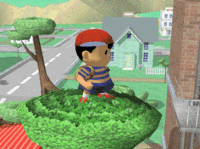
|
Idle pose
- Looks from side to side.
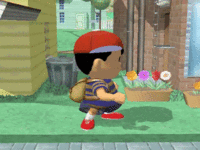
|
|---|
Crowd cheer
| English | Japanese | |
|---|---|---|
| Cheer | File:Ness Cheer NTSC Melee.ogg | |
| Description | Ness Ness Ness! | Ness Ness Ness! |
| Pitch | Group chant | Group chant |
Victory poses
- Looks to the left and right of him, then places his right arm on the back of his head.
- Swings around his bat four times, then poses with it.
- Jumps up and down twice, places arms on waist, and says "Okay!"
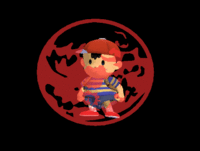 |
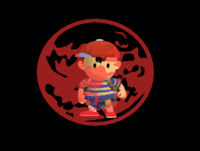 |
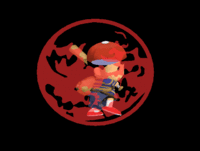
|
|---|
In competitive play
Most historically significant players
- Any number following the Smasher name indicates placement on the MPGR Summer 2022, which recognizes the official top 50 players in the world in Super Smash Bros. Melee.
- See also: Category:Ness players (SSBM)
Simna ibn Sind - Placed 13th at EVO 2007 and 17th at Super Champ Combo. Currently only attends EVO and GENESIS, funded by his Twitch Livestream donations. Simna ibn Sind is also known to be the person who discovered the Thunder Jacket.
Mofo - One of the most influential Ness mains known for discovering many glitches such as the Star Jacket, Spike Jacket and the yoyo stack glitch. Considered the best Ness in the world from 2009 to 2014 before retiring, has taken a set off Gravy and Captain Smuckers.
JoeyBats - Top Canadian Ness boasting the highest tournament placements and highest rates of tournament participation among Ness players in 2021 on Project Slippi netplay.
Tier placement and history
Ness was initially consolidated as a solid mid-tier character in the early metagame of Melee, with a peak of his 15th position on the second tier list, tying with Zelda and Link for the 14th-16th position in the third tier list, as his flaws were not properly highlighted often during that time, and his retained strengths, such as a fearsome combo game in conjunction with DJC, the potency of his grab game and the yo-yo glitch, as well as his decent zoning game were discovered more often. In addition, Hungrybox picked up Ness and played him in all of Apex 2013, in an attempt to catch Armada's Young Link (which was developed specifically to fight Hungrybox) offguard, despite mostly using Jigglypuff for the rest of the tournament, and notably defeated Nihlus in Low Tier City 4. By extension, Nihlus picked up Ness as his main, and has seen notable competitive success with the character. However, as the metagame developed, several players began to attribute the severity of his flaws, such as his unimpressive KOing ability, slow mobility, lackluster range, and most prominently; his catastrophic recovery. All of those flaws combine with his troublesome approach, the situationality of his special movset and his lack of reliable ways to escape disadvantage to be considerable barriers of entry. This has been rectified in the fifth and sixth tier lists, ranking Ness at the 20th position at the top of low-tier. Even if he was slightly bolstered by a single spot in the seventh tier list, his overall position remained similar.
Following this, however, Ness' standing on the tier list almost instantly fell down to the bottom-tier, beginning with the eighth tier list, with most players noticing that his nerfs from Super Smash Bros. drastically impaired his KOing power and his already poor and linear, predictable recovery; this was especially noted in the earlier Smash 64 metagame, as Ness was initially perceived as a top-tiered character. This has caused a drastic decline, and Ness persistently hovered around bottom 4/6 around the following tier lists.
On the current tier list, Ness ranks at 23rd, near the lower half of the D tier, and he is considered non-viable for tournament play. Dedicated Ness players are rare in the current metagame, with most Ness players often using him only as a situational counterpick. Hungrybox only played as Ness once in all of Apex 2013, in an attempt to catch Armada's Young Link (which was developed specifically to fight Hungrybox) off-guard, and he mostly mained Jigglypuff for the rest of the tournament. As for the other players of Ness, they are semi-active and generally fail to rank exceptionally well with him.
In 1-P Mode
Classic Mode
In Classic Mode, Ness can appear as an ordinary opponent, as an ally or opponent in the team battles, alongside Yoshi, Peach, or Mewtwo, as a member of a multi-character battle, or as a metal opponent. In Ness's appearance, he appears on either Onett or Fourside (if unlocked) as a regular opponent and on Battlefield as a metal opponent. When on a team with Yoshi, he appears on Yoshi's Island.
Adventure Mode
Ness's appearance in the Adventure Mode is in Stage 9: Onett. In the stage, the player must fight against three computer players, each one being Ness, on Onett; in the fight, the only item that appear is Mr. Saturn. The player must defeat all three opponents within five minutes to continue.
All-Star Mode
Ness and his allies are fought on Onett.
Event Matches
Ness is featured in the following event matches:
- Event 5: Spare Change: the player controls Ness and fights Captain Falcon in a coin battle on Onett. The player must collect 200 coins within 80 seconds in order to clear the event.
- Event 30: All-Star Match 3: Ness is the third opponent to be fought in this series of staged battles. The player battles him on Onett, which will transition to the next stage if Ness gets defeated. With a timer of four minutes, the player must defeat him along with Kirby, Pikachu and the Ice Climbers.
- Event 36: Space Travelers: As Ness, the player must defeat Samus, Kirby, Fox, Captain Falcon, and Falco. The player battles the first three characters on Fourside and battles the last two on Battlefield.
Ending images
Trophies
In addition to the normal trophy about Ness as a character, there are two trophies about him as a fighter, unlocked by completing both Adventure and All-Star modes respectively with Ness on any difficulty:
- Ness
- Ness is a young boy who's mastered the psychic power known as PSI. Ness was living a normal life in the suburbs of Onett until a meteor crashed into a nearby mountain and sent him on a wild adventure. Believing in the ultimate powers of wisdom, courage, and friendship, Ness proves that some heroes come in small packages.
- EarthBound (6/95)
- EarthBound (Not Released in Europe)
- Ness SMASH
- The key to mastering Ness is controlling his unique midair jump, which makes up for what he lacks in speed. His PK Flash attack may seem weak at first glance, but it grows more powerful the longer you hold down the B Button. To do a lot of damage with PK Fire, try to burn your opponent as many times as possible.
- B: PK Flash
- Smash B: PK Fire
- Ness SMASH
- Ness's mind is his best weapon. PK Thunder is a PSI missile weapon that can be guided using the Control Stick, and if Ness hits himself with it, he turns into a living missile capable of doing massive damage. This move can also be used for recovery. PSI Magnet turns energy missile attacks into health; try out certain Pokémon for stamina replenishment.
- Up & B: PK Thunder
- Down & B: PSI Magnet
Alternate costumes
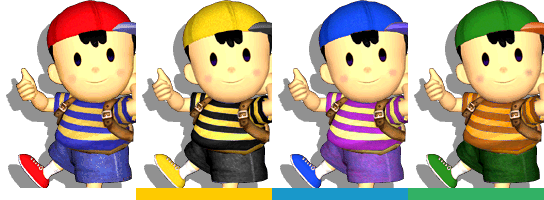
| |||
Gallery
Using PSI Magnet on Brinstar.
Using his down smash on Onett.
Using PK Flash on Captain Falcon on Brinstar.
Jumping over The Runaway Five tour bus on Onett.
Using PK Thunder 2 on Brinstar.
Standing with Donkey Kong, Kirby, and Luigi on Great Bay.
Posing with Kirby on Temple.
Using PSI Magnet near Mewtwo on Final Destination.
Trivia
- Although Ness is no longer able to auto-snap to the ledge out of aerial PK Thunder, modifying the move to be able to do so and grabbing the ledge while PK Thunder is being controlled reveals that it will despawn as it would in the original Super Smash Bros.. This even happens with v1.00 behavior where normally, the thunder ball continues to fly if Ness is hit while controlling it, possibly suggesting that PK Thunder auto-ledge-snap may have been considered initially.
- When Ness's profile page was updated on July 17th, 2001, Sakurai revealed that Ness was meant to be replaced by Lucas from Mother 3. However, as Mother 3 was facing development issues and had its original Nintendo 64 release cancelled, Ness was brought back instead.
- Interestingly, the command structure for Ness's Down-Aerial matches up with its Brawl counterpart, though it lacks the late hitbox. It is very likely that Down-Aerial was programmed this way erroneously, since it has two 'Synchronous Timer' flags (4 frames and 5 frames) before the hitbox is cleared, adding up to 9 frames, while most moves only have one.
- The PK Fire pillar appears to have a windbox-like property. Information on this attribute is scarce and it seems to only happen under specific circumstances.
- Melee is Ness's only appearance where PK Thunder has transcendent priority. In every other Super Smash Bros. title, it can be clanked with.
- Ness is one of three characters whose neutral special changed during his jump to Melee, the others being Link and Jigglypuff. In the original Super Smash Bros., his neutral special was PK Fire; from Melee onward, he now uses PK Flash. As with the other two, his original neutral special remains in the game, having been transferred to the newly added side special move slot.
- If one looks closely at Ness's Yoyo, they can see the words DOLPHIN LOOP, with it being made by HALLAB NINTENDO in 2001 (Melee's release year), Dolphin being a reference to the Gamecube's codename, and the "makers" a reference to the developer and publisher of Melee respectively. His bat reads NETT SPORTS.
- Hitting Ness as he's using PK Thunder can cause his body to constantly produce sparks afterward, though these sparks only provide a cosmetic effect. This glitch continues until he gets KOed, shields, or performs PK Thunder again.
- Ness's amiibo description on the North American amiibo website is based on his trophy description from Melee.
External links
| Fighters in Super Smash Bros. Melee | |
|---|---|
| Veterans | Captain Falcon · Donkey Kong · Fox · Jigglypuff · Kirby · Link · Luigi · Mario · Ness · Pikachu · Samus · Yoshi |
| Newcomers | Bowser · Dr. Mario · Falco · Ganondorf · Ice Climbers · Marth · Mewtwo · Mr. Game & Watch · Peach · Pichu · Roy · Young Link · Zelda (Sheik) |
|
| |
|---|---|
| Fighters | Ness (SSB · SSBM · SSBB · SSB4 · SSBU) · Lucas (SSBB · SSB4 · SSBU) |
| Assist Trophies | Jeff · Starman |
| Bosses | Porky Statue · Porky |
| Stages | Onett · Fourside · New Pork City · Magicant |
| Items | Mr. Saturn · Franklin Badge · Ramblin' Evil Mushroom |
| Enemies | Devil Car · Starman |
| Other | Boney · Flying Man · Kumatora · Paula · Poo · Rope Snake · Ultimate Chimera |
| Trophies, Stickers and Spirits | Trophies (SSBM · SSBB · SSB4) · Stickers · Spirits |
| Music | Brawl · SSB4 · Ultimate |
| Masterpiece | EarthBound |
